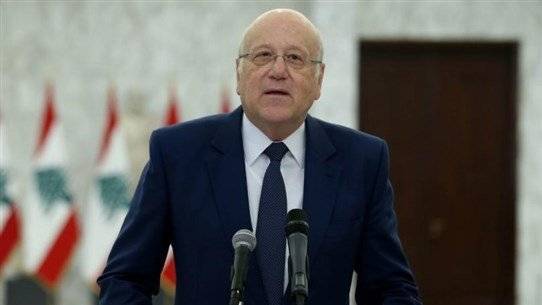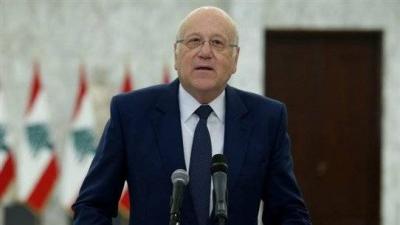An Arab diplomatic source in Beirut mentions that the political data available to him so far confirm that the new government will inevitably led by President Najib Mikati. Alternative names proposed for the role are seen as a way for certain parties to raise their political demands in order to improve their conditions within the forthcoming cabinet composition. He points out to "Asharq Al-Awsat" that while Mikati is the most favored to head the last government during President Michel Aoun's term, he is not willing to return to the leadership at any cost, as further delays would be costly and would negatively affect the country, which is on the brink of collapse, according to nations willing to help it recover from the crisis it has reached its peak.
The Arab diplomatic source, who constantly communicates with most active political forces, asserts that Mikati refuses to be bound by conditions from any party, having conveyed his stance to everyone he meets. Submitting to such conditions would mean he would be acting as an agent for mismanagement, managing a crisis while signing off on its extension.
The source interprets the conditions Mikati places for assuming the premiership not as a way to evade responsibility, but as firm requirements that he insists on upholding. He aims to detach the financial recovery plan, reforms, and the rehabilitation of the electricity sector from political conflicts; because without a secure political safety net, it cannot resume negotiations with the International Monetary Fund, an essential path for transitioning the country from crisis to relief.
The same source views the mandatory parliamentary consultations, which President Aoun is expected to conduct to name the designated prime minister to form the government, not just as a means to fill a vacancy but should be accompanied by facilitating the task of forming a cohesive government that takes on serious steps towards rescuing the country from the depths of the crisis it faces. This requires all parties involved to rise above personal interests to create an opportunity to meet the International Monetary Fund halfway to achieve the desired goal of rescue.
The source questions the utility of some parties preemptively promoting that there is no issue with reassigning Mikati to form the government, but the real problem lies in his capability to do so. This opens up the possibility of retaining a caretaker government for the remaining period of President Aoun's term, set to end on October 31st. He argues that the cabinet's composition should align with the country's needs and serve as a lifeline to halt its unprecedented collapse.
He further questions the benefits of certain factions insisting on obstructing the efforts to form a government, as long as the cabinet composition doesn't resonate with their political ambitions. What will they tell the Lebanese people and the international community, which insists they must help themselves first to ensure receiving international aid tied to reaching an unalterable agreement with the International Monetary Fund?
In this regard, a parliamentary source hopes that the President will call the deputies to participate in the parliamentary consultations and not link setting a date for these consultations to the completion of names suggested by the head of the Free Patriotic Movement, Representative Gibran Bassil, to assume the premiership, considering it has been rumored that Bassil prioritizes the formation of the government over designating who will form it.
The parliamentary source warns against repeating past experiences in this regard, having proven concretely that they did not help pave the way for the establishment of a government. He aligns with a prominent opposition source who accuses Bassil of hindering the formation of governments and currently behaving as if Aoun is still in the early months of his presidency, believing he has the opportunity to impose his conditions for a political government that would provide cover for his ally "Hezbollah."
The opposition source points out that Bassil is no longer in a political position that enables him to impose conditions on the designated prime minister after he has failed to coerce Mikati, who has shut the door on him by refusing to include administrative appointments and formations on the cabinet's agenda to ensure the continuity of the president's political legacy. He emphasizes that the so-called "shadow president," in reference to Bassil, lacks leverage to blackmail the caretaker prime minister and engage in political bargaining regarding the formation of the government.
He adds that Bassil's threats of nominating someone for the premiership will hold no value, as there is no successor to Mikati with an international network of relations that would allow them to approach the international community for assistance. He states that whoever nominates this candidate will witness the country reverting to square one, quickly realizing that their gamble is misplaced. They will find themselves in a confrontation with major components of the Sunni community, who will resist what he plans, as it would disturb the balance and the principle of partnership governing the political equation in the country, along with undermining the Taif Agreement.
The opposition source warns against succumbing to Bassil's demands, which aims to create a government where he has the final word if a new president cannot be elected before the current term ends. He mentions that "Hezbollah", while giving Bassil some time to improve his conditions, cannot afford to extend this timeframe due to the political damage it entails, which stretches beyond domestic issues to the international level, burdening it with high costs related to accusations of exploiting its power inappropriately for its ally.
Moreover, Nabih Berri, the Speaker of the Parliament, although he has been compelled to ally with Bassil in some electoral districts at "Hezbollah’s" request, is not inclined to harmonize with him if he insists on hindering the formation of the government. Therefore, while the premiership will likely go to Mikati if the political forces comply with his conditions for launching a mission to rescue the country—albeit belatedly—it must be accompanied by a "fully qualified" government as the international community expects. This is to prevent plunging the country into a vacuum managed by a caretaker government, which means the country will enter a prolonged political crisis as the presidential deadline approaches.




